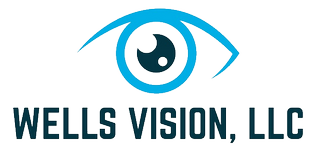FIRST TIME VISIT ?
At Wells Vision, we know that most eye and vision conditions can be minimized or prevented completely with proper preventive eye care. Dr. Channing Wells is passionate about protecting her patients and diagnosing problems as early as possible, and eye exams are the best way to do that. If you haven’t had an eye exam recently, it might be time to schedule an appointment.
We want you to be informed and prepared, so we’ve answered some of your most common questions about eye exams. If you have any more questions or concerns, feel free to ask your eye doctor during your next appointment.
Most eye care experts recommend that you have a comprehensive eye exam every one to two years, depending on your age, risk factors and whether you currently wear corrective lenses. Children need regular eye exams to detect vision problems that may interfere with learning.
The dilating drops that we typically use last, on average, 4-6 hours before they wear off. Occasionally, we use longer lasting eye drops in younger children, which can last approximately 24 hours. Most people do feel comfortable to drive after their pupils have been dilated.
Routine eye exams are important whatever age or overall health. Regular eye exams can provide early detection of vision problems, eye diseases, and other general health related problems before they become an issue. Based on the results of your comprehensive eye exam, your Optometrist will determine a treatment plan (if needed) for your eye health needs. Further, eye exams can often lead to the early detection of non-vision illnesses. So anyway you look at it, regular eye exams can only be beneficial to you, so you wouldn’t you have them?
In an initial exam, Dr. Wells will examine your eyes to determine if you can wear contact lenses. Your prescription and the curvature of your eye are measured and any special needs you may have will be discussed. The doctor will then determine the type of contact lenses that best fit your eyes, prescription and lifestyle while ensuring that your eyes remain healthy.
The following is a partial list of symptoms in children and adults which indicate the need to schedule a check up:
- headaches, nausea or dizziness after visual concentration
- blurred or double vision at any time
- crossed or turned eyes
- blinking or eye rubbing after visual concentration
- dislike or avoidance of close work
- short attention span
- placing head close to book when reading or writing
- frowning while looking at the TV or blackboard
- difficulty reading small print
- difficulty adjusting focus between near and far objects
It depends on how well you follow your eye doctor’s advice. All contact lenses reduce the amount of oxygen reaching the transparent layer covering the eye, known as the cornea, and this can increase the risk for eye problems. Following the advice of your optometrist or optician can reduce this risk. The risk for infections and other eye health problems is low if you follow your optometry professional’s recommendations.
Yes, there are now many different types of contact lenses, including:
- Disposable Soft that you can wear for a few days before throwing away
- Daily Wear are reusable or disposable lenses comfortable enough for all-day wear
- Extended Wear that you can wear for several days
- Toric lenses that correct astigmatism, a defect in the eye that causes distorted images
- Multifocal / Bifocal that correct both distance and reading vision
- Rigid Gas Permeable lenses are a smaller, more rigid contact lens
Make an Appointment
When you notice changes to your eyes and vision, you want to make an appointment for an eye exam to identify the underlying cause of the visual changes. A professional evaluates your visual health and provides appropriate treatment options. To learn more about keeping your eyes healthy or to make an appointment for a vision exam at our clinic, contact us today.

